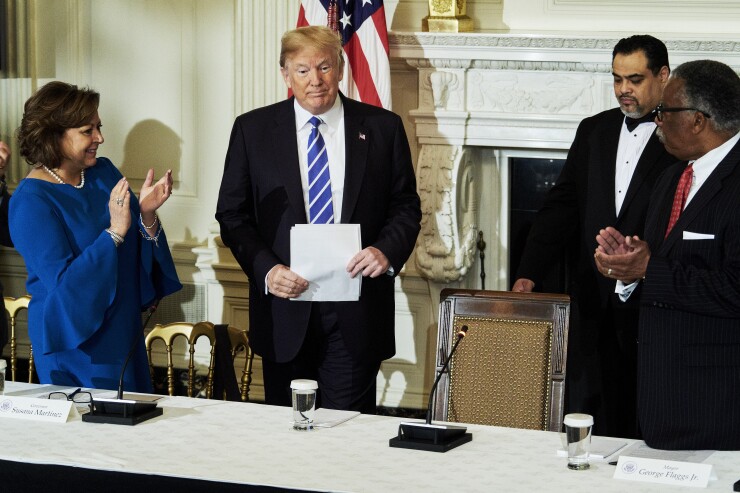WASHINGTON – The Trump administration on Monday released a federal budget for fiscal 2019 that a spokesman for the National League of Cities described as a proposal for a “historic disinvestment in cities.”
Among the many programs proposed for elimination are Community Development Block Grants (CDBG), the Low Income Home Energy Assistance Program (LIHEAP), the Community Services Block Grant (CSBG), HOME and the Housing Trust Fund.
It also proposes eliminating 17 programs involving K-12 education totaling $4.4 billion and the Economic Development Administration.
In addition, the administration wants to sell the assets of the Tennessee Valley Authority and three Power Marketing Authorities to state and local governments or the private sector.

The White House budget request also came under fierce criticism from Democrats in Congress for asking them to eliminate funding for a wide range of popular state and local grant programs.
Senate Democratic Minority Leader Chuck Schumer of New York described the $4.4 trillion budget proposal as “utterly astounding” because it would cut funding for Medicaid and Medicare six weeks after Trump signed legislation “slashing taxes on the wealthy and biggest corporations, creating a huge deficit.”
Republicans were muted in their response, saying they would review the White House requests.
Senate Finance Committee Chairman Orrin Hatch, R-Utah, said he will use upcoming committee hearings on the budget requests to ensure the nation continues to have strong economic growth. “From program integrity reforms that streamline the government to further deregulation to help job creators cut through bureaucratic red tape, this fiscal roadmap embraces important goals that deserve a thorough examination,” Hatch said.
Congress last week approved a bipartisan agreement on fiscal 2018 and 2019 defense and domestic spending that greatly reduces the influence of the White House in upcoming deliberations.
House and Senate appropriations committees have until March 23 to finalize fiscal 2018 spending using an additional $80 billion for defense $63 billion for non-defense discretionary programs beyond the old spending caps.
And later this spring, lawmakers will be able to tackle fiscal 2019 spending bills with an additional $85 billion for defense and $68 billion for non-defense discretionary programs.
Rather than delay release of the proposed budget to reflect those new spending levels, the White House added an addendum to its 2019 proposal with a list of its suggested revisions that don’t undo most of the cuts to state and local grants.
Sen. Patrick Leahy from Vermont, the ranking Democrat on the Senate Appropriations Committee accused Trump of “abandoning the bipartisan budget deal” he signed into law last week.
“This is not a serious proposal; it is divorced from reality,” he said.
Michael Wallace, program director for Community and Economic Development at the National League of Cities, said the cuts in aid to local governments constituted “a little bit of a mixed message.”
“Cumulatively across the whole budget if all of those cuts were enacted, it would be a historic disinvestment in cities,” Wallace said. “It also would be a historic disengagement with city leaders and local officials across the country. And that’s completely opposite of the infrastructure plan which is seeking to partner with local officials and city leaders.”
As Trump's budget for fiscal 2019 was proposing cuts or zeroing out popular state and local programs, he met with two dozen governors, mayors, state lawmakers and county officials to the White House Monday for a roundtable discussion of his plan for using $200 billion in federal spending on infrastructure over 10 years to leverage $1.5 trillion in state, local and private investment.
“I’m happy to have a dialogue with the president on these issues and to raise the importance to America’s mayors of preserving the tax exemption of muni bonds and his support of private activity bonds as well,” Mayor Steve Benjamin of Columbia, S.C., chairman of the Municipal Bonds for America Coalition said in an interview afterward.
Benjamin, however, said he is concerned about the proposed “rearranging of priorities” with proposals to cut TIGER and long-distance Amtrak service.
“All those give me grave concern,” said Benjamin, referring to the proposed cuts to Community Development Block Grants, the HOME program and law enforcement grants. “We recognize that any investment in infrastructure is a good investment. We would like to see more of an investment but we’ve got to make sure we are not just investing in building roads and bridges, but also investing in people and creating a high quality of life for all out people.”
The American Public Power Association said it would “adamantly oppose” the administration’s proposal to divest the transmission assets held by the Tennessee Valley Authority, the Southwestern Power Administration, Western Area Power Administration, and Bonneville Power Administration.
APPA said the assets of the TVA and the three power marketing authorities “have been paid for by electricity customers.”
“The PMAs provide millions of Americans served by not-for-profit public power and rural electric cooperative utilities with cost-based hydroelectric power produced at federal dams,” APPA said. “PMA rates are set to cover all generation and transmission costs, as well as repayment, with interest, of the federal investment in these hydropower projects. None of the costs are borne by taxpayers.”





